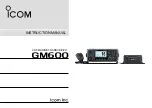
2
68-2201-50 Rev. A
09 15
© 2015 Extron Electronics — All rights reserved. All trademarks mentioned are the property of their respective owners.
www.extron.com
b.
To pass bidirectional serial, infrared, or other control signals, connect a control device or a
device to be controlled to the RS-232 and IR Over XTP connector (
E
and
K
).
NOTE:
RS-232 and IR data can be transmitted simultaneously. The ground pole is shared.
c.
Connect a host device or control LAN or WAN to the LAN RJ-45 connector (
G
and
J
) for
pass-through 10/100 Ethernet communication. The LEDs indicate link and activity status.
Step 4
—
Connect Outputs
a.
Connect a digital video display to the HDMI output
connector (
L
) on the receiver.
b.
Connect a balanced or unbalanced, stereo or mono audio
device to the 3.5 mm, 5-pole captive screw connector (
M
)
on the receiver for 2-channel stereo analog audio.
c.
Connect an audio device to the female orange RCA connector (
N
) tor for digital S/PDIF audio output.
Step 5
—
Connect Control Devices, Relays, and Power
a.
Connect a host device, such as a computer, to the front panel female USB mini-B connector
(see
P
to the right) of the transmitter or receiver to configure the device or update firmware.
b.
Connect the equipment controlled via momentary or latching contact, like projector screens or lifts,
to these normally open relays (
O
). Do not exceed 24 V at 1 A for each port.
c.
Connect the provided external power supply to the 2-pole captive screw connector (
A
and
H
).
Operation
After all transmitters, receivers, and connected devices are connected and powered on, the system is fully operational.
NOTE:
Use the Extron XTP System Configuration Software or SIS commands to configure the transmitter or receiver (see the
XTP FT HD 4K and XTP FR HD 4K User Guide
on the Extron
website
).
HDMI Audio Switch
On either device, move and hold (for about 1 second) the HDMI audio switch (
C
and
L
) up to enable embedded audio on a
display connected to the associated HDMI connector or down to disable it. The switch returns to the middle position after it has
been released. The associated LED lights when audio is enabled and remains unlit when audio is disabled.
Indicators
Power LED
— Lights on the front and rear panel when power is applied to the device.
Transmitter indicators
Signal LED
— Lights when an active TMDS
clock signal is detected from the source.
HDCP LED
— Lights when the input signal is encrypted.
HDMI Audio LED
— Lights when the HDMI input audio is selected in auto-switch mode or through SIS commands.
Analog Audio LED
— Lights when the analog audio input is selected in auto-switch mode or through SIS commands.
Audio Signal Clip LED
— Lights red when the analog audio input signal remains above -3 dBFS. It remains lit for 200 ms after the
signal falls below -3 dBFS.
Receiver indicators
Signal LED
— Lights when an active XTP signal is received.
HDCP LED
— Lights when the input XTP signal is encrypted.
HBR LED
— Lights when the embedded audio signal is high bit rate audio.
HDMI LED
— Lights when the input audio format is multi-channel, LPCM-2Ch, or Hi-Def audio.
Bitstream LED
— Lights when the input audio signal is Dolby Digital, DTS audio format and 2-ch Dolby.
S/PDIF LED
— Lights when the input audio format is multi-channel (except HBR) or LPCM-2Ch.
LPCM LED
— Lights when the input audio signal is LPCM-2Ch.
Analog LED
— Lights when the input audio format is analog audio.
Do not tin
the wires!
Balanced Audio Output
Tip
Ring
Tip
Ring
Sleeves
Unbalanced Audio Output
Tip
No Ground Here
No Ground Here
Tip
Sleeves
LR
LR
XTP T HDMI
CONFIG
INPUT
AUDIO SIGNAL CLIP
HDCP
SIGNAL
ANALOG AUDIO
HDMI AUDIO
P
CONFIG
INPUT
AUDIO SIGNAL CLIP
HDCP
SIGNAL
ANALOG AUDIO
HDMI AUDIO
CONFIG
INPUT
AUDIO SIGNAL CLIP
HDCP
SIGNAL
ANALOG AUDIO
HDMI AUDIO
XTP FT HD 4K
CONFIG
XTP
HDCP
SIGNAL
AUDIO
HDMI
HBR
S/PDIF
BITSTREAM
ANALOG
LPCM
CONFIG
XTP
HDCP
SIGNAL
AUDIO
HDMI
HBR
S/PDIF
BITSTREAM
ANALOG
LPCM
XTP FR HD 4K
Tx/Rx
Pins
Rx
Tx
RS-23
2
Rx
Tx
Tx
Rx
Rx
Tx
IR Device
RS-232 Device
G
G
G
IR




















